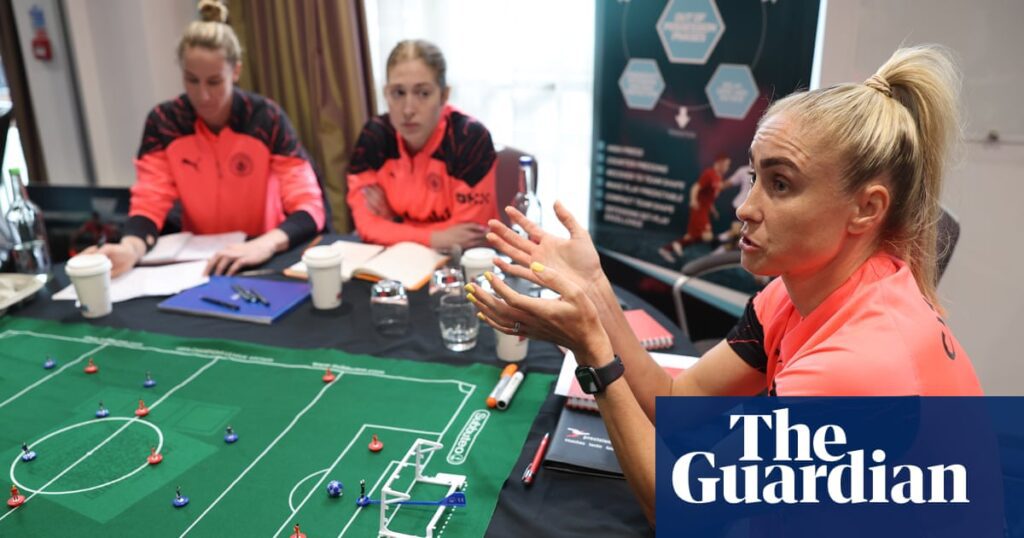Empowering the Next Generation: Women’s Coaching at Manchester City
“Who is the spare player? Where’s the space? Yes, yes, let’s go!” The spirited encouragement rings out as the under-16 girls’ squad of Manchester City undergoes training at the City Football Academy. Each polished drill concludes with a satisfying ripple through the net, a testament to their skills in development.
Shaping Future Stars
On this chilly December evening, not only the young players are being nurtured but also the aspiring coaches on the sidelines. A group of women participating in the latest UEFA A license course, led by the FA, is guiding the session. These faces, familiar to fans of the Women’s Super League, embody the future of football coaching.
Leading the Charge
The session is overseen by an impressive roster of experienced figures: former City and England captain, Steph Houghton; ex-City, Lyon, and Everton midfielder, Izzy Christiansen; and current players such as Scotland’s Lisa Evans, Manchester United’s Aoife Mannion, and City goalkeeper Sandy MacIver. They are currently at the midway point of a groundbreaking course designed to increase female representation in coaching roles.
A Collaborative Initiative
This inaugural all-female A license cohort was announced in May through a partnership between the FA and the Professional Footballers’ Association. Steve Guinan, the FA’s senior professional game player-to-coach lead, emphasizes the importance of retaining talented individuals in the sport: “We’re addressing under-representation and striving to encourage women coaches in both men’s and women’s football.”
A Need for Representation
Currently, five of the 12 head coaches in the Women’s Super League are women, including interim Arsenal head coach Renée Slegers, with only two, Rehanne Skinner (West Ham) and Laura Kaminski (Crystal Palace), being British. The men’s professional game has yet to permanently employ a female manager.
Bridging the Gap
Mannion reflects on historical challenges, stating, “The league hasn’t been professional for long, so there hasn’t been a natural transition for players to become coaches.” However, she believes that the current influx of qualified women will lead to an exciting future in coaching.
A Progressive Course Structure
The course includes 17 current and former WSL players, including record goalscorer Vivianne Miedema and Chelsea’s Zecira Musovic. The initial residential camp at St George’s Park has branched into geographical groups, focusing on building attacking strategies during this Manchester session.
Learning and Growing Together
Mannion is collaborating closely with Houghton, who transitioned from her playing career after an esteemed spell that included 121 international caps. Houghton recalled her quick shift from player to coach: “It was a rapid adjustment, but I’ve really enjoyed this new chapter.”
Gaining Insight into Coaching
Evans and MacIver are actively developing a box midfield strategy to foster attacking options. Evans comments on the enlightening experience coaching provides, recognizing the extensive preparation involved behind the scenes to ensure a smooth training session.
Looking Ahead
Reflecting on her post-playing future, Evans expressed her passion for football, highlighting newfound insights into coaching that encompass psychology and sports science. Guinan elaborates on the practical focus of the A license, which centers on player management and problem-solving on the pitch.
A Unique Opportunity
Funded by the PFA, UEFA, and the FA, this all-female course is an invaluable endeavor, according to Mannion. Despite the challenges, she finds coaching thrilling and envisions contributing to a team’s growth and development.
Finding Personal Coaching Identity
Mannion acknowledges the influence of previous managers but underscores her desire to carve her unique coaching identity. Houghton, now exploring her role as a pundit and ambassador for City, shares the joy of witnessing learners grow under her guidance.
Future Potential
Guinan observes the sessions with an analytical eye, preparing for subsequent feedback to continue fostering an environment that not only develops skills but aims to bolster the presence of women in technical and coaching roles throughout football.


